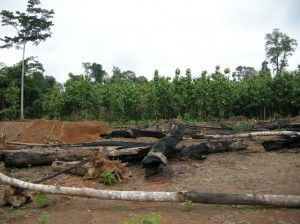The path toward sustainable land use needs a new quality of private and public cooperation.
This is – simplified – the take away from a discussion of scientists involved in the CGIAR Research Program on Forests, Trees and Agroforestry (FTA) about global governance, trade and investment, and how they impact on forests and people.
Global commodity markets shape forest landscapes and the livelihoods of people but their role cannot be over-emphasized, since several other factors mediate their actual impacts, researchers agreed. But without governments guaranteeing land tenure, infrastructure and rule of law, no development is possible.
In their discussion they shared examples underpinning the tension between these two poles.

The experience with forest certification – aimed at fostering sustainable forest management – showed that there are limitations to what the market alone can achieve, Patrice Levang from IRD (Institut de Recherche pour le Développement) and seconded to the Center for International Forestry Research (CIFOR) argued.
His colleague George Schoneveld concurred, saying that such sustainability initiatives run the risk of creating disincentives for investors to productively engage smallholders due to high costs of monitoring their compliance.
Governments could force investors to be more inclusive – e.g. through building in conditions into concession agreements – but they still need to provide support services to both investors and smallholders to help them succeed, said Schoneveld. And those governments need to make sure that smallholders who are included in investment schemes effectively integrate new cash crops into their farming systems in order to prevent conversion of forestland and competition for farmland. However, this needs to be done in a way that safeguards local food security.
Anne Terheggen from the World Agroforestry Centre (ICRAF) said that no industry can work in isolation. “They all need to use the same road, the same harbor.”
But the market would not be able to “consistently work despite the government or against the government. Because at some point they will pull out and take their business somewhere else.” She spoke out for an “economy-wide system change.”
Paolo Cerutti, CIFOR Scientist, agreed that “there are points beyond which the market is not able to bypass the need for public regulations.” So when the limitations of public and private sphere clash, a third dimension is needed that goes beyond both, he advised.
CIFOR Principal Scientist Pablo Pacheco, who moderated the discussion, spoke of new ‘hybrid’ arrangements by state and non-state institutions that can harness public and private strengths and shape governance conditions.
Schoneveld found that PPPs and cross-sectoral thinking belong together when it comes to integrated land-use planning.
Weak governments – strong corporations?
Pacheco raised the issue of weak states with strong corporate presence and the question of whether they are able to put in place more inclusive processes.
While agreeing that this poses a problem, Cerutti warned against calling them weak states because many leaders are not weak at all. It is rather that – despite knowing what would be the most effective decisions for the country – they make politics in their private interests.
So the challenge, added Levang, is to find ways of bringing together the interests of “autocrats” with those of their constituencies. And there are win-win solutions to be implemented before an economy-wide system change happens.
Policies can shape markets
 Schoneveld found it difficult to give general recommendations for policies on incentives for more sustainable land-use practices. “It’s very different for different sites,” he said.
Schoneveld found it difficult to give general recommendations for policies on incentives for more sustainable land-use practices. “It’s very different for different sites,” he said.
“And the mechanisms you need are very site and crop specific… We really have to think about what is relevant in each location to address very specific issues. It depends on the crop, the farming system, the land tenure situation, and the ecology,” he added.
Although participants concurred with this view, Terheggen upheld that “it is possible for policy to shape a sector and to shape a sector in a beneficial direction.” She referred to ongoing research on governments’ industrial policies in Malaysia and Indonesia for palm oil, and in China and Laos for rubber. “These industries were actually created almost from the ground up. And they still influence behavior today,” she added.
“It all boils down to what are the core government functions” that ensure why some countries are failing and others aren’t. “It’s infrastructure, it’s property rights, it’s law – it’s actually law enforcement these days.” She stressed the necessity of “digging” through the existing information.
A historical approach to understand how institutions “materialized somehow” is also favored by Paolo Cerutti.
Read the full transcript of the discussion here











